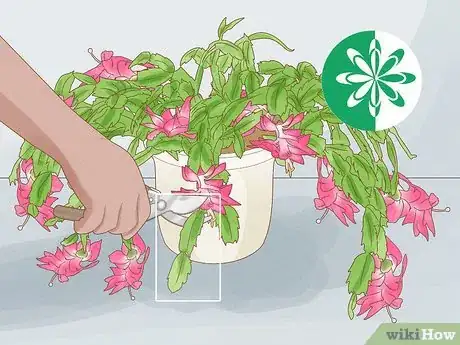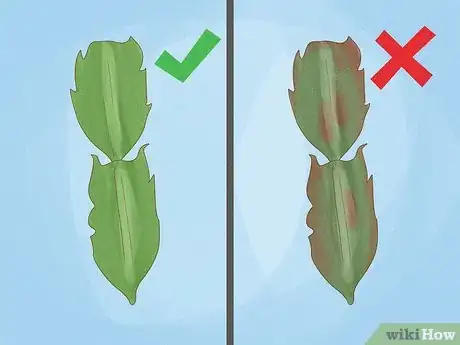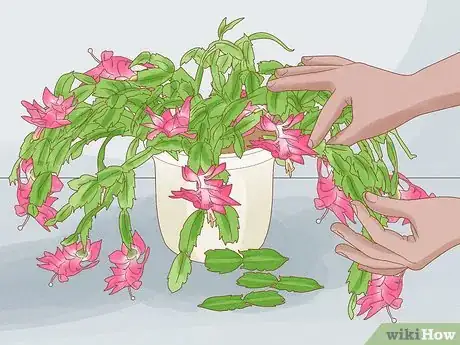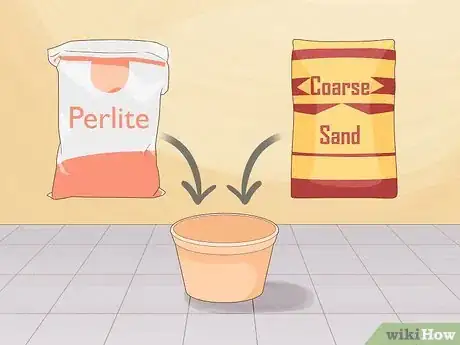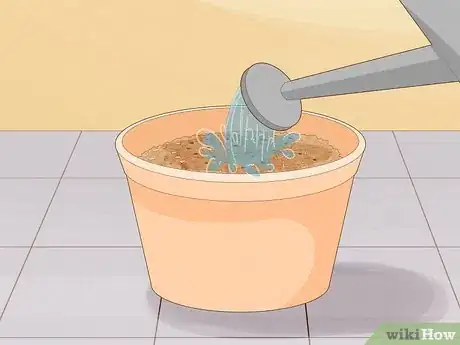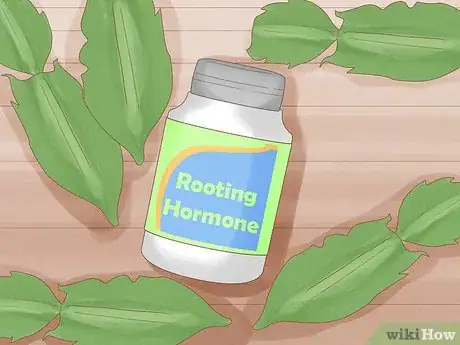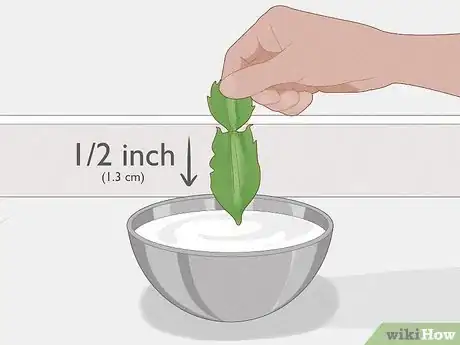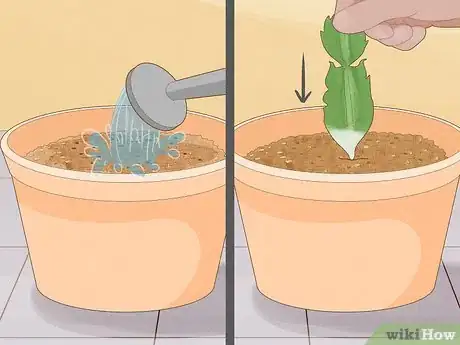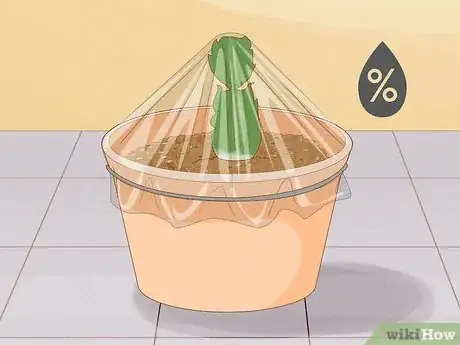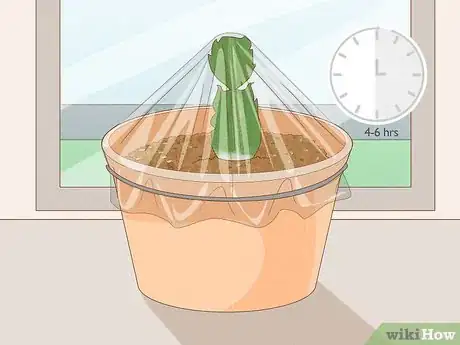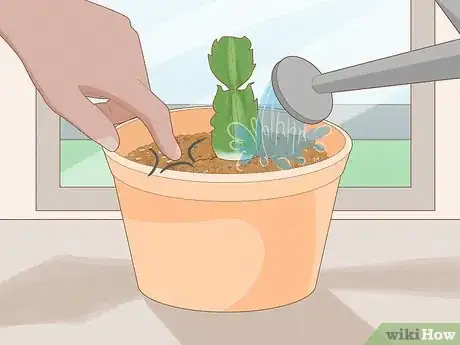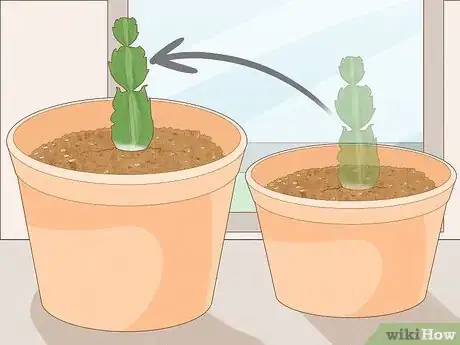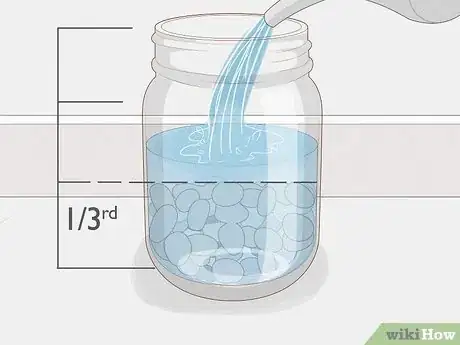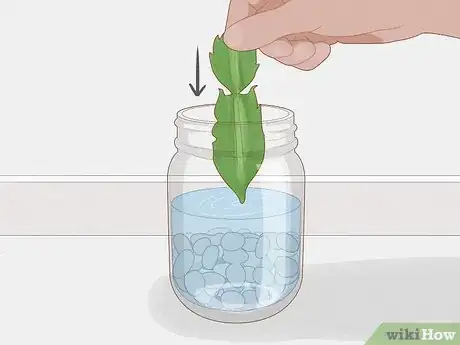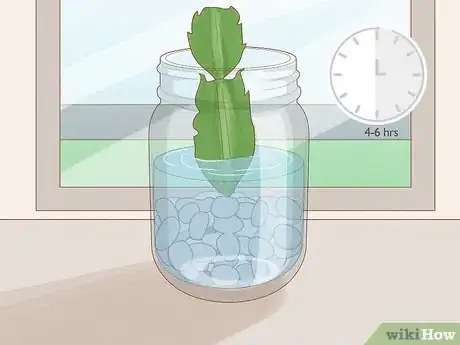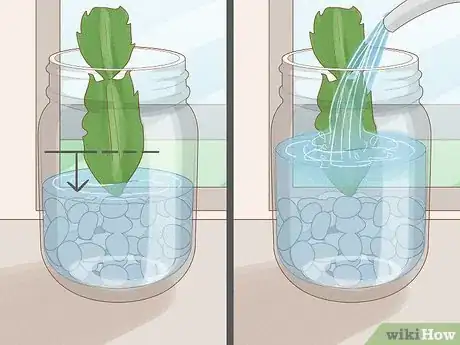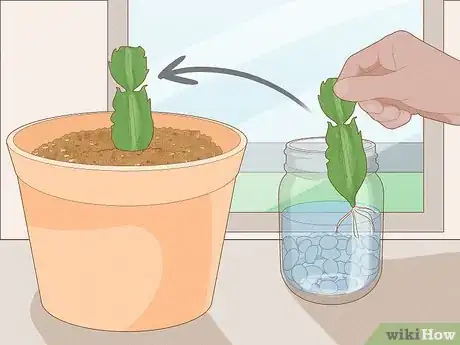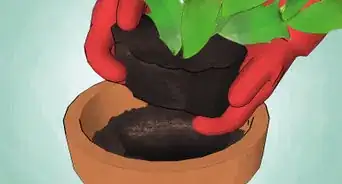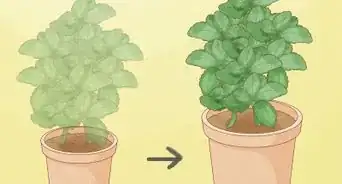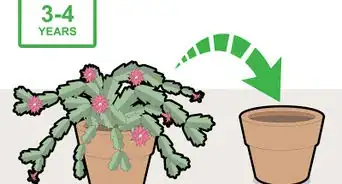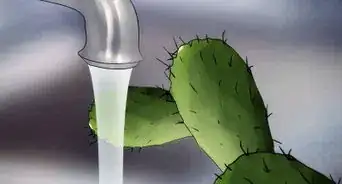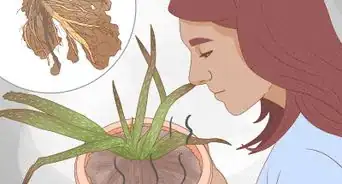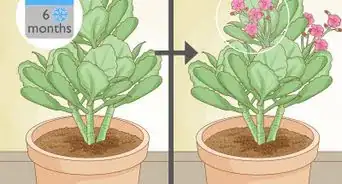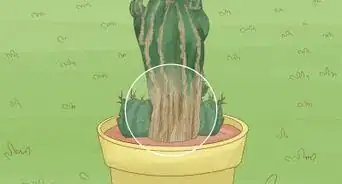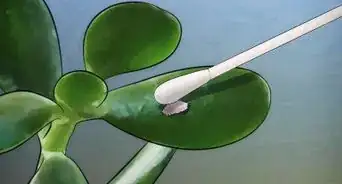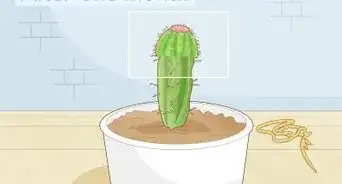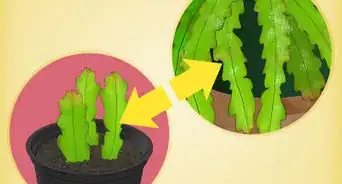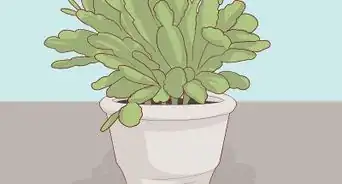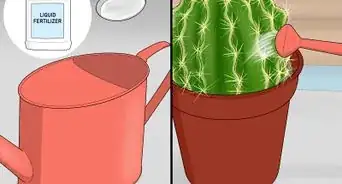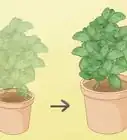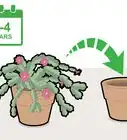This article was co-authored by Chai Saechao. Chai Saechao is the Founder and Owner of Plant Therapy, an indoor-plant store founded in 2018 based in San Francisco, California. As a self-described plant doctor, he believes in the therapeutic power of plants, hoping to keep sharing his love of plants with anyone willing to listen and learn.
There are 17 references cited in this article, which can be found at the bottom of the page.
This article has been viewed 65,852 times.
Christmas cactuses are beautiful houseplants that are popular for the bright flowers they bloom during the holiday season. If you have a healthy Christmas cactus and want to grow another, you can easily propagate your plant by clipping off a small cutting and allowing it to take root in a pot with a rooting medium or in a small jar with stones and water. Once it takes root, repot and care for your Christmas cactus to help it grow and thrive.
Steps
Taking Cuttings from Your Cactus
-
1Take your cuttings in late spring for the best chance of growth. Christmas cacti generally start growing around May and bloom in November or December. It's best to take cuttings at the beginning of the growing season in early spring. This gives the cactus time to emerge from its post-blooming rest period and initiate new growth.[1]
- Technically, you can take your cuttings any time during the year, but doing it in early spring gives you the best chance of successfully growing a new, healthy plant.
-
2Find a healthy stem on the cactus to take your cutting from. Examine your host Christmas cactus for a branch that doesn’t have an brown spots.[2] In addition, look for a branch that has at least 2 cladophylls (branch segments), since cuttings generally need at least 2 branch segments to take root.
- You can generally take multiple cuttings from a healthy host plant without harming it, but don't take off too much.[3]
Advertisement -
3Pinch off 2 to 5 healthy branch segments from your cactus with your fingers. Remove 2 to 5 of the flattened segments of the branch by pinching them off at the joint with your fingers. You may need to twist and fold the branch at the joint to loosen it up enough so you can pinch the segments off.[4]
- You can also cut the segments off at the joint with a small knife.[5]
-
4Leave the cuttings on a dry surface overnight. Lay the cuttings out in a single layer on a dry surface indoors so the joint can begin to heal. In most cases, you can leave it out to dry for up to 2 days.[6]
- If you leave the cutting out for several days, it may start to wilt at the ends. If this happens, pinch off the wilted end segments so only the healthy segments remain.[7]
Using a Rooting Medium
-
1Fill a small pot with perlite or coarse sand. While your cuttings are drying, fill a small pot with a drain hole to the brim with a Christmas cactus rooting medium, such as perlite, coarse sand, or a half and half combination of the two.[8] You can also use a half and half mix of seed and cuttings compost and course sand instead of perlite.[9]
-
2Run water over the rooting medium to dampen it. Place the filled pot in the sink and water the rooting medium until it’s damp across the top. Leave the pot in the sink for a few minutes to allow the water to drain through.[10]
-
3Dip the tip of the cutting in rooting hormone powder to stimulate growth, if desired. To increase the chance that your cutting with take root, dip the end of the cutting into a rooting hormone powder until it’s covered with powder. Tap the branch gently to remove any excess powder before planting the cutting.[11]
- While using a rooting hormone may help stimulate growth, you can propagate Christmas cactus without it. If you don’t want to use a rooting hormone, skip this step.
-
4Insert about 1⁄2 inch (1.3 cm) of your cutting into the rooting medium. Hold the cutting upright and press the bottom end into the rooting medium about 1⁄2 inch (1.3 cm) deep.[12] Lightly press the perlite or sand rooting medium down around the cutting to help it stand upright.[13]
- If you’re planting multiple cuttings in the same pot, plant them 2 to 6 inches (5.1 to 15.2 cm) apart.[14]
- If the cutting won’t stand up straight, push it down into the rooting medium a bit more until it’s about 1 inch (2.5 cm) deep.
- Pushing the cutting too far down can cause it to rot, so only bury it as deep as needed to keep it upright.[15]
-
5Water the perlite or sand again and let it drain. Place the pot with the planted cutting back into the sink and water it again to remoisten the soil and help it pack down around the cutting. Let the rooting medium sit in the sink for a few minutes to drain. Then, place the pot in a tray or dish.[16]
-
6Cover the cuttings and pot with a clear plastic bag to create humidity. If you’re propagating your Christmas cactus in a location that doesn’t get much humidity, cover the cuttings and the pot with a clear plastic bag. Wrap a rubber band around the rim of the pot to secure the bag in place.[17]
- The plastic bag traps in moisture and mimics the humidity of a greenhouse. Humidity helps the cuttings take root.
-
7Position the pot where it can get 4 to 6 hours of bright, indirect light daily. Bright, indirect light ensures the cuttings get enough sunlight to grow roots without getting overheated. For best results, keep the room temperature at about 65 to 69 °F (18 to 21 °C) to mimic the temperate climate Christmas cactuses prefer.[18]
-
8Water the cuttings when the soil feels dry. Check on the pot every day or so to see if the rooting medium has begun to dry out. When it feels dry to the touch, water your cutting until the soil is moistened. Allow the pot to sit in the sink to drain for a few minutes before returning it to its location.[19]
- How often you’ll need to water your cutting will vary. To ensure that the rooting medium doesn’t dry out and kill the growing roots, try checking on it every other day.
-
9Repot the cutting with cactus soil when it starts to grow. You'll know your cutting is rooted when you see new, green growth. At this point, carefully dig around the cutting with your fingers to loosen the roots and pull it out of its current pot. Transfer the cutting into a larger pot with cactus soil or a well-draining all-purpose soil. Push the roots down into the new pot and cover them with soil.[20]
- It can take anywhere from 3 to 12 weeks for your cutting to take root and start to grow on top.[21]
Growing Roots in Water
-
1Fill the bottom of a jar with stones and water. First, fill the bottom third of a jar with medium-sized stones. Then, fill the jar with water until the water just covers the tops of the stones.[22]
- You can also use a glass drinking cup or anything that is tall and small enough to hold the cutting upright.[23]
-
2Place the cutting in the jar so only the bottom is submerged. Holding the cutting upright, stick it into the jar until only the end of the bottom stem section is submerged. Let it rest on or between 2 stones to hold the cutting in this position.[24]
- The humidity from the water and rocks helps the cutting grow roots, while keeping it just barely submerged prevents it from rotting.[25]
-
3Put the jar where it will get 4 to 6 hours of bright, indirect sunlight daily. The bright light helps the cutting get the sunlight it needs to grow roots and eventually bloom. Keeping the plant out of direct sunlight prevents the leaves from burning and drying out.[26]
-
4Refill the water as needed to keep the bottom of the cutting submerged. Check on your Christmas cactus cutting periodically to make sure that the bottom of the cutting remains submerged. If the water level drops too low, refill it until the growing roots and bottom portion of the bottom stem section are completely under water.[27]
-
5Plant the cutting in soil when the roots are as long as 2 stem sections. Once the roots have grown as long as a small cutting (about 2 stem sections), carefully transfer the plant into a pot filled with cactus soil or a well-draining all-purpose soil.[28] Use your fingers to create a small hole in the middle of the soil and gently push the roots down into the hole. Cover them with soil and pack it down gently to keep the cutting upright.[29]
- It can take up to 8 weeks for your Christmas cactus cutting to grow roots.[30]
Expert Q&A
-
QuestionAre cacti easy to care for?
 Chai SaechaoChai Saechao is the Founder and Owner of Plant Therapy, an indoor-plant store founded in 2018 based in San Francisco, California. As a self-described plant doctor, he believes in the therapeutic power of plants, hoping to keep sharing his love of plants with anyone willing to listen and learn.
Chai SaechaoChai Saechao is the Founder and Owner of Plant Therapy, an indoor-plant store founded in 2018 based in San Francisco, California. As a self-described plant doctor, he believes in the therapeutic power of plants, hoping to keep sharing his love of plants with anyone willing to listen and learn.
Plant Specialist Generally speaking, yes, cacti tend to be one of the easier plants to care for. They do well outside in the shade so you don't need to worry about getting them a ton of sunlight, and you don't need to water them at all in the colder months.
Generally speaking, yes, cacti tend to be one of the easier plants to care for. They do well outside in the shade so you don't need to worry about getting them a ton of sunlight, and you don't need to water them at all in the colder months.
Things You’ll Need
Taking Cuttings
- Small knife (optional)
Using a Rooting Medium
- Christmas cactus rooting medium
- Pot with drainage hole
- Rooting hormone (optional)
- Clear plastic bag
- Rubber band
Growing Roots in Water
- Jar
- Stones
- Water
References
- ↑ https://www.almanac.com/plant/christmas-cactus#
- ↑ https://hortnews.extension.iastate.edu/faq/how-can-i-propagate-christmas-cactus
- ↑ https://www.epicgardening.com/propagating-christmas-cactus/
- ↑ https://youtu.be/dxDdV6_mim4?t=57
- ↑ https://gardenologist.org/root-christmas-cactus-cuttings-water/
- ↑ https://hgic.clemson.edu/factsheet/thanksgiving-christmas-cacti/
- ↑ https://youtu.be/dxDdV6_mim4?t=51
- ↑ https://hortnews.extension.iastate.edu/faq/how-can-i-propagate-christmas-cactus
- ↑ https://www.rhs.org.uk/advice/profile?PID=840
- ↑ https://hortnews.extension.iastate.edu/faq/how-can-i-propagate-christmas-cactus
- ↑ https://www.gardenfundamentals.com/use-rooting-hormone-correctly/
- ↑ https://www.rhs.org.uk/advice/profile?PID=840
- ↑ https://hortnews.extension.iastate.edu/faq/how-can-i-propagate-christmas-cactus
- ↑ https://www.planetnatural.com/plant-propagation/
- ↑ https://www.rhs.org.uk/advice/profile?PID=840
- ↑ https://hortnews.extension.iastate.edu/faq/how-can-i-propagate-christmas-cactus
- ↑ https://hgic.clemson.edu/factsheet/thanksgiving-christmas-cacti/
- ↑ https://www.rhs.org.uk/advice/profile?PID=840
- ↑ https://hortnews.extension.iastate.edu/faq/how-can-i-propagate-christmas-cactus
- ↑ https://aces.nmsu.edu/ces/yard/2002/012602.html
- ↑ https://www.rhs.org.uk/advice/profile?PID=840
- ↑ https://youtu.be/6q4wjOFj9So?t=101
- ↑ https://gardenologist.org/root-christmas-cactus-cuttings-water/
- ↑ https://youtu.be/6q4wjOFj9So?t=109
- ↑ https://youtu.be/6q4wjOFj9So?t=120
- ↑ https://www.gardeningknowhow.com/ornamental/cacti-succulents/christmas-cactus/advice-for-christmas-cactus-care.htm
- ↑ https://gardenologist.org/root-christmas-cactus-cuttings-water/
- ↑ https://aces.nmsu.edu/ces/yard/2002/012602.html
- ↑ https://youtu.be/fVV9UrcWsdo?t=52
- ↑ https://gardenologist.org/root-christmas-cactus-cuttings-water/
- ↑ https://youtu.be/6q4wjOFj9So?t=16
